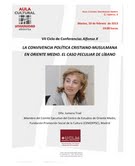
As part of the VII Conference Lecture Series “Alfonso X”, organized by the University of Castilla-La Mancha, on February 20, Jumana Trad, Executive Committee member CEMOFPSC, focused her speech on the Arab Spring and Syrian impact on its neighboring country: Lebanon.
“The Christian-Muslim political coexistence in the Middle East: the peculiar case of Lebanon”
In recent years, with the Arab up risings, in a very tense political context in the region, minorities, and particularly the Christians, of the three countries, and not the smallest, Egypt, Syria and Iraq, are living in critical days for their future. While in Lebanon, the only area that includes freedom of religion and equality of all its citizens in its constitution, there is a great risk that the war in Syria could spread to it.
The Arab Spring revolts in Syria have become a bloody civil war with increasingly sectarian overtones, the pro regimes are mostly Alawites and Sunni rebels. The country is descending into anarchy and impoverishment, while the UN has already recorded 70,000 deaths.
Currently, Lebanon, a country of 4 million people, is host to a large number of refugees: there are more than 305,000 people, according to the census of the United Nations Agency for Refugees, who have crossed the borders to escape the violence in Syria, but this figure could be higher, due to the presence of a large number of workers in this country of liberal economics and more prosperous than its neighbor.
Lebanon is a small country and very unique in this part of the world. 18 different denominations and religious rites of the three monotheistic religions live together: Christian, Muslim and Jewish. All citizens have equal rights and duties, while the constitution guarantees religious freedom. Its political system is democratic, dividing among all faiths public office and liberal economy. This fragile political system is being threatened for decades by violence and civil conflict, and also by neighboring Israel and Syria.
Many Lebanese have a painful memory of the Syrian occupation of the country (1976-2005) and want no part of the problem. While the memory of the arrival of Palestinian refugees in Lebanon 60 years ago, still unsolved, has led the government did not want to take any decision as to the reception of Syrian refugees, although lately, and alerted by organizations civil society, has given approval for the launch of two refugee camps for up to 5,000 people, located on the Syrian border, west of the country.
Meanwhile, refugees can be installed in a Lebanon that have suffered 15 years of sectarian civil war, and there are fears that violence from escalating. Indeed, the same Lebanese population is divided between those who support the Syrian government (mainly Hezbollah and Alawites armed groups) and those who support the insurgents (Sunni armed groups). Some clashes have already occurred in the north and south, while the situation in the border towns is very delicate, because they are often the target of such confrontations.
Despite pessimistic forecasts, it is expected that a negotiated solution through dialogue can occur before the conflict ends dragging more countries to the storm.
Jumana Trad
Patron of the FPSC and Executive Committee member of the Center for Middle Eastern Studies of the FPSC

